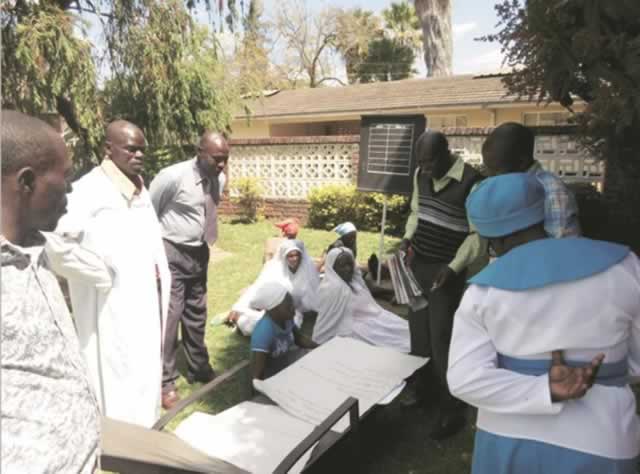War to end child marriages

Paidamoyo Chipunza Senior Health Reporter
“Everyone knows how to slaughter a hen. Likewise people should know how to end HIV and AIDS! Why is it that when people are tasked to catch a hen for a relish, it is quickly done but when we are tasked to end HIV, it takes forever,” were the words of Headman Chiveso of Musana, Bindura.
Contributing to the discussion on child marriages and how they exposed young girls to diseases such as HIV in addition to violating their rights, Headman Chiveso, who was representing Chief Musana, said child marriages and other ills of society must be stopped.
Headman Chiveso said while there were some areas where people still marry off young girls for traditional reasons, in his area the tradition was now history.
Challenges of traditional marriages remain though they are now on a steady decline. Traditional leaders and faith-based organisations are now part of the war to end child marriages, an ill that is threatening the future of girls.
Some traditional leaders are at the forefront of the campaign to end abuse of children and appeal to their counterparts to take the initiative.
“We have put an end to all that in our area. We no longer settle cases involving child marriages at our courts,” Headman Chiveso said.
He said all headmen under Chief Musana has been tasked to compile registers of all school-going age children both girls and boys and to keep track of their growing.
Headman Chiveso said the registers are submitted to Chief Musana who will follow up with the schools to establish whether the pupils were going to school.
“He does personal follow-ups in the schools to see if the children are still going to school. That is where he picks up cases of those who have been married off,” he said.
Once he picks up such cases, he then reports them to the police for further action in accordance with the laws of the land.
The schoolchildren tracking programme started in 2012 and since then there has not been any known case of children married off in his area.
He, however, admitted that previously young girls were married off to older men for various reasons.
Traditionally, young girls were married off as a form of appeasement to avenging spirits – a practice known as kuripa ngozi.
This happens when one commits murder and the aggrieved family demands compensation in the form of a young girl and beasts to appease the avenging spirits. Without that, it is claimed a bad omen such as unpredictable deaths and illnesses will befall the family.
Traditionally, it was also acceptable to marry off young girls to families that always had a good harvest. The family would in turn provide food to their in-laws from time to time.
“Marrying off young girls is now history in my area. I ended all those practices. I now actually want to visit those areas which are still marrying off young girls on traditional grounds to really understand why they are still violating the rights of young girls in this day and age where there are many diseases such as HIV,” said Headman Chiveso.
In Zimbabwe, young girls were married off for various reasons ranging from traditional, religious and society pressures.
While the practice is dying out, Headman Chiveso said a few cases of child marriages were being done in faith-based churches. Union for the Development of Apostolic Churches in Zimbabwe secretary-general Mr Edson Tsvakayi said it was common practice for young girls to get married at a very tender age within the apostolic sects.
He said male worshippers would just declare that they were given the targeted girl in a vision or dream as their wife and it would happen like that. The young girl would then get married to the older man regardless of whether he had other wives or not.
“While this practice was according to beliefs and doctrines of some sects of the Apostolic Church we have now taken a new stance in line with global trends that it is high time we discourage each other from religious practices that are harmful to the girl child,” said Mr Tsvakayi.
As a result of this belief many young girls become mothers before they are ripe for marriage. The majority of child mothers know no door to a school and all they do is give birth and do little tasks such as sewing pillows and garments for resale as a source of income.
“Kana mweya wataura hapana anopikisa,” was the common saying among such sects whose doctrines also allowed men to marry as many wives as they wish.
Mr Tsvakayi said in partnership with Government, United Nations agencies, non-governmental organisations and different apostolic sects, UDACIZA embarked on a programme to increase awareness of the laws protecting women and children against early marriages.
He said these campaigns are in turn expected to reduce incidences of child marriages, polygamy and false prophets.
“We encourage members to have child protection centred policies and gender based violence elimination approaches. UDACIZA is deeply concerned by the abuse of children and women in their churches which has disadvantaged them in political, social and economic activities in the country,” he said.
Women followers of the apostolic sects also concurred that while they accepted the practice as religion, they were against marrying off their children at such early ages.
The women claimed that in the church, men dictate and implement doctrines and women have no say.
“It was painful to see our young girls being mothers at a very early age. We could not stop it because the men had the final say but we are happy UDACIZA has taken a step in the right direction to save our daughters,” said Mrs Emerenzia Muganhiri of Unit H in Chitungwiza.
In our society, there are known cases of families who support marriage of minor children to well-off families though majority of such cases go unreported.
These cases normally happen when a child is sexually abused and falls pregnant. The perpetrator proposes to marry the under-age girl to avoid prosecution.
However, the majority of these cases only come to light when the partners fail to agree and now seek intervention of the courts for recourse.
According to the report of the Office of the United Nations High Commissioner for Human Rights on preventing and eliminating child, early and forced marriage prevention of such practices is only possible through legislative measures, dialogue with traditional and religious leaders, empowerment of young girls and protection measures in place.
Global statistics on child marriages show that about 39 000 girls are married off each day. This translates to 14 million girls each year worldwide – about the whole population of Zimbabwe.
Child marriages expose girls to poverty, reduced opportunities for excelling in life, expose them to all forms of abuse by their spouses because of power dynamics.









Comments